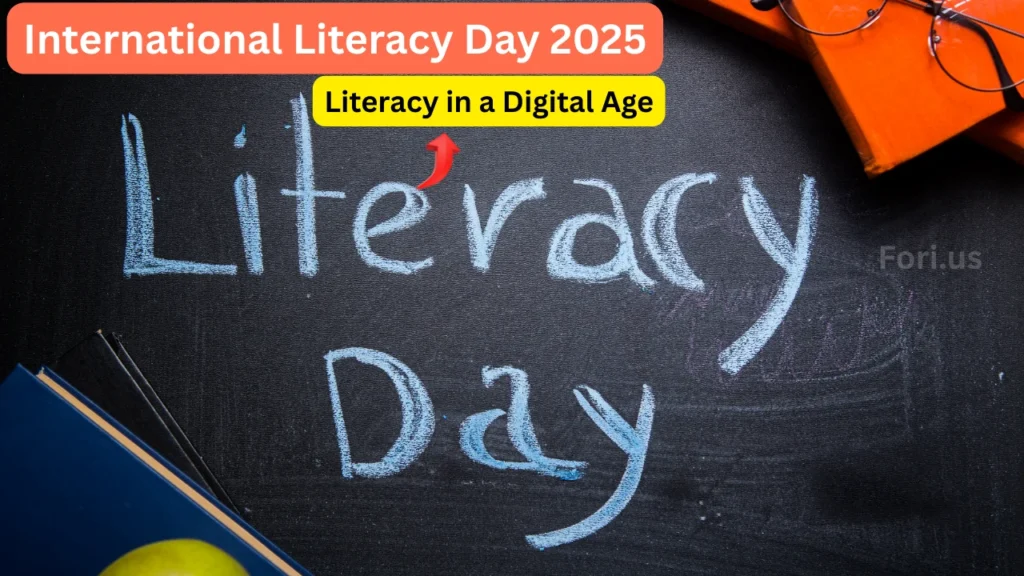Each year, the world pauses on September 8 to mark International Literacy Day 2025, a reminder that the ability to read and write remains one of humanity’s most powerful tools for progress. This day is not only about celebrating education but also about examining the gaps that still exist, with the greatest impact still felt by disadvantaged groups and women.
The 2025 theme, “Literacy for a Transforming World”, highlights the growing need for functional, digital, and financial literacy in today’s rapidly changing society. While global literacy rates have improved significantly since the day’s creation, millions of people are still excluded from opportunities that literacy brings.
Social Security Checks: Who Gets Paid on 10th September 2025

International Literacy Day 2025: Why It Still Matters
| Date | 8th September 2025 |
| Established By | UNESCO (1966) |
| First Observed | 1967 |
| Global Literacy Rate | Over 86% in 2025 |
| 2025 Theme | “Literacy for a Transforming World” |
| Key Focus | Digital, financial, and functional literacy |
How International Literacy Day First Began
The idea for International Literacy Day was introduced by UNESCO in 1966, with the first global observance taking place in 1967. Back then, the majority of people worldwide lacked the basic ability to read or write. Illiteracy was recognized as one of the major barriers to social and economic development.
By establishing this day, the global community sought to make literacy a universal priority. It became a yearly moment to measure progress, share new strategies, and recommit to ensuring that everyone, regardless of background, has access to basic education.
Tariffs Hit Home-John Deere Faces $500M in New Costs
Progress Since 1967
Over the past five decades, literacy rates have climbed dramatically. As of 2025, UNESCO reports that more than 86% of the global population is literate. This progress is a testament to international campaigns, government policies, and grassroots movements that have pushed for universal education.
Yet, the advancement in literacy has not been equally shared across all regions. Women and marginalized groups, particularly in developing nations, remain disproportionately affected by illiteracy. Conflict, displacement, and economic inequality further widen these gaps, showing that the journey toward universal literacy is far from complete.
Why Literacy Matters Beyond Letters
Literacy goes far beyond simply knowing the alphabet. It provides people with the ability to access knowledge, secure opportunities, and participate fully in society.
- For children, literacy is the gateway to lifelong learning.
- For adults, it can mean breaking cycles of poverty and gaining independence.
- For societies, literacy supports democracy, economic growth, and social equality.
The pandemic years also exposed a new frontier: digital literacy. Lack of internet access and digital skills left millions of learners behind, proving that modern literacy must adapt to new realities.
The Theme of 2025: Literacy for a Transforming World
The 2025 observance emphasizes the role of literacy in navigating rapid technological and social changes. As artificial intelligence, automation, and digital platforms transform jobs and daily life, basic reading and writing are no longer enough.
Social Security Cuts Reversed: Retro Checks Now Arriving
Modern literacy now requires:
- Functional literacy for navigating everyday tasks.
- Digital literacy for using technology effectively.
- Financial literacy for managing money and participating in the economy.
By linking literacy to these broader skills, the theme underlines how education must evolve to meet the challenges of the future.
Global Efforts and Celebrations
Governments, educators, and activists around the world use International Literacy Day to highlight progress and push for greater inclusion. Some common activities include:
- Book donation drives to expand access in underserved areas.
- Community workshops on digital and financial literacy.
- Policy discussions focusing on educational reforms and inclusivity.
- Campaigns to draw attention to children still out of school or adults denied education.
These initiatives remind the world that literacy is not just a milestone but a continuing responsibility.
New Format Drivers: DMV Confirms Plates Running Out
Challenges That Remain
Despite global improvements, significant hurdles remain:
- Millions of children are still out of school due to poverty, conflict, or lack of infrastructure.
- Many adults in rural and poor areas never receive the chance to learn.
- Digital divides mean some communities are left behind in the modern world.
For 2025, the message is clear: literacy is not a privilege for some but a right for all.
Looking Ahead
The future of literacy depends on how well the global community addresses these challenges. Efforts must focus on:
- Ensuring inclusive education policies.
- Expanding digital tools and internet access.
- Providing flexible programs for adults and displaced populations.
International Literacy Day 2025 is both a celebration of progress and a call to action. The unfinished work requires governments, NGOs, and communities to work together to close the literacy gap once and for all.
FAQs About International Literacy Day 2025: Progress and Gaps
It is observed on September 8 every year.
UNESCO proclaimed it in 1966, and the first observance took place in 1967.
This year’s theme focuses on “Literacy for a Transforming World,” reflecting the growing demand for new skills in a rapidly changing society.
Beyond reading and writing, literacy includes digital and financial skills, which are essential for modern life and work.
Over 86% of the world’s population can now read and write, though gaps remain.
International Literacy Day 2025 reminds us that literacy is more than a skill — it is the foundation of opportunity and dignity. While the world has made remarkable progress since 1967, millions are still excluded from the benefits of education.
As the theme suggests, in a transforming world, literacy must go beyond the basics to include digital and financial knowledge. The challenge now is to ensure no one is left behind in this new era of learning.
